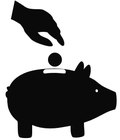Banks Complete Buy-Back, More Coming?

New statements from 2 of China’s top 4 banks indicate a recent share buyback by their state-owned controlling stakeholder is done, raising the question of just how effective the program was and whether we might see more similar buybacks soon. Based on my own quick analysis, the program does seem have had some limited positive effect, with Shanghai-listed shares of both ICBC (HKEx: 1398; Shanghai: 601398) and Agricultural Bank of China (HKEx: 1288; Shanghai: 601288) outperforming the market over the last 6 months during the program period. But that said, China bank shares have been relative laggards over the longer term in general due to concerns about a bad loan crisis, and their modest outperformance over the last 6 months doesn’t offset their broader weakness over the last few years. Still, I wouldn’t be surprised to the banks’ controlling shareholder, Central Huijin, launch a new buyback program in Shanghai, or possibly even in Hong Kong, to signal to the market that Beijing remains committed to supporting the country’s Big 4 lenders.
All that said, let’s take a look at the latest announcements from ICBC and AgBank, which both said that Huijin recently wrapped up its 6-month buyback program launched on October 12 last year. ICBC, China’s largest lender, said Huijin bought an additional 211 million of its shares during the period, which means Huijin spent about 800 million yuan on the buyback, or slightly more than $100 million. (company announcement) The newly purchased shares represented a relatively miniscule 0.06 percent of ICBC’s total share count, bringing Huijin’s total holdings to 35.46 percent of the bank.
Meantime, AgBank said Huijin bought 231 million of its shares during the buyback period, meaning Huijin probably paid about 600 million yuan for the shares. (company announcement) The newly purchased shares accounted for about 0.07 percent of AgBank’s total, bringing Huijin’s overall stake in the bank to 40.23 percent.
So, what exactly did Huijin, which was almost certainly acting under orders from Beijing, get for its combined 1.4 billion in spending on shares of the 2 big banks? My quick analysis shows that AgBank’s shares did relatively well during the period, rising 10 percent versus a 6 percent rise for the broader market. ICBC shares did less well, but still managed to slightly outperform the broader market.
Overall the results look relatively satisfactory, since Chinese banks have generally underperformed the market in both Hong Kong and Shanghai in recent years. So this modest outperformance should come as a welcome relief for Beijing, especially when one considers its 1.4 billion yuan investment in the buyback was relatively modest compared to the banks’ market values that total in the tens of billions of dollars.
So let’s return to the original question of whether or not we’re likely to see more buybacks in the next 12 months. In my view, the relative success and cheap cost of this just-completed buyback means that more such moves could come in the next year, for either ICBC or AgBank or also potentially for the nation’s other 2 Big 4 lenders, Bank of China (HKEx: 3988; Shanghai: 601398) and China Construction Bank (HKEx: 939; Shanghai: 601939).
Such buybacks could come in either Shanghai or Hong Kong, depending on how the banks’ shares in both markets are performing. Barring any major bad news, such buybacks do seem like a good value to boost the banks’ shares in an otherwise quiet climate. But if bad news does start to come, most likely in the form of a spike in bad loans or slowing profits, this kind of modest share buyback will do little to halt the sell-off that would likely follow such a negative turn.
Bottom line: Recent buybacks of ICBC and AgBank shares look modestly successful, raising the possibility of more buybacks in the next 12 months.
Related postings:
